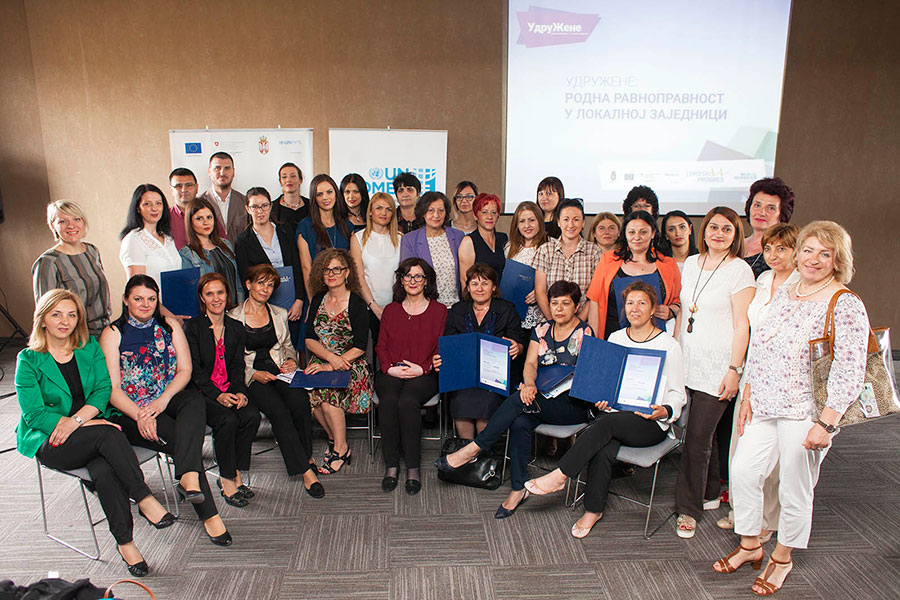Gender equality policy and female participation in public life at the local level is a precondition for the development of any society, concluded the participants in the conference “Women united: Gender equality in local community” which brought together more than 100 councilwomen and councilmen from South East and South West Serbia, members of the national and provincial Women’s Parliamentary Network and representatives of local governments and local gender equality mechanisms.
Branka Draskovic, Advisor to the Deputy Prime Minister of the Government of Serbia and Chairwoman of the Coordination Body for Gender Equality, opened the conference by saying that every country whose goal was to achieve economic and social prosperity advocated empowerment of women and their inclusion in the political, economic, and social life of a country.
Stefana Miladinovic, an MEP, Coordinator of the Women’s Parliamentary Network of Serbia, reminded the audience about the way women in legislative bodies organised in informal groups, comprising members of all political parties and movements, succeed at reaching a consensus regarding certain social issues despite their differences – thus promoting a different political dialogue. “Today, guided by the idea of female solidarity and encouraged, we want to change the society, the politics and ourselves,” said Stefana Miladinovic.
The establishment of the legal and institutional framework for improving gender equality has been supported for the last decade both by the European Union and the Government of Switzerland through European PROGRES and other development programmes preceding it and, as Priska Depnering, Deputy Director of the Swiss Cooperation Office said, substantial progress and positive changes have been made in that regard. Namely, the share of councilwomen in local assemblies stands between 20 and 25 per cent; all 34 local self-governments included in the implementation of the European PROGRES have local gender equality mechanisms; 30 municipalities have adopted the European Charter for Equality of Women and Men in Local Life; and most have local action plans.
Stressing the importance of today’s event which demonstrates how, if organised well, women can significantly contribute to gender equality by working together, Deputy Director of the Swiss Cooperation Office said that the Swiss Government remained committed to supporting advancement of gender equality, as it constituted a step forward in creating a society that offers equal opportunities to all and is prosperous both socially and economically.
“Gender equality is one of European values and fundamental rights, which is why the European Union supports a number of projects aimed at improving gender equality,” said Ana Milenic, the contact person for gender equality at the EU Delegation to Serbia, announcing that the EU would continue to support empowerment of women in local communities.
Through European PROGRES, the European Union and the Government of Switzerland have provided support for economic empowerment of women, women’s entrepreneurship, exercise of human rights and improvement of healthcare for women. Also, they supported 18 projects in the municipalities in South East and South West of Serbia implemented by local gender equality mechanisms to improve the social and economic status of women.
“We did not just talk about gender equality, we implemented it at all levels of society and government, NGOs, particularly those that promote the rights of Roma of both genders and of women,” said Graeme Tyndall European PROGRES Programme Manager and added that gender equality and economic empowerment of vulnerable groups are the main elements of activity of the United Nations Office for Project Services, the organisation in charge of implementing this development programme.
UN Women, the United Nations Entity for Gender Equality and the Empowerment of Women in Serbia, has implemented a range of activities to strengthen the capacity of women councillors in 10 municipalities across Serbia, once again with the support of the European Union and the Government of Switzerland.
Milana Rikanovic, Head of the UN Women Office in Serbia, pointed out that our needs were not the same and that the manner in which we plan usually has different impacts on male and female citizens and not all will benefit the same from our policies and investments. “The effects of our work are best seen at the local level; therefore, it is important to support local gender equality policies,” said Rikanovic.
The members of female councillor networks and local gender equality mechanisms were awarded plaques for the support to gender equality policies and improvement of women’s position at the local level.




